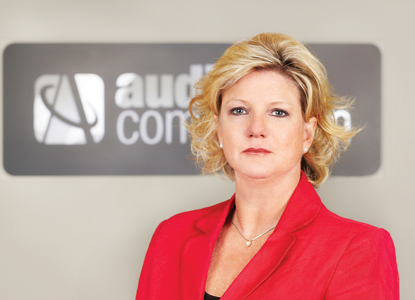By Vivienne Russell | 13 December 2012
Audit Commission head Marcine Waterman has said the watchdog’s annual review of all local authority accounts is vital work that must continue after its abolition.
 Waterman, who is controller of audit, was speaking to Public Finance as the commission published its Auditing the accounts report today. This showed that councils and other local bodies continued to improve the quality and timeliness of their financial reporting last year.
Waterman, who is controller of audit, was speaking to Public Finance as the commission published its Auditing the accounts report today. This showed that councils and other local bodies continued to improve the quality and timeliness of their financial reporting last year.
Of the 472 principal bodies in England, 426 or 90% had published audited 2011/12 accounts by the September 30, 2012 deadline. None of the accounts published so far have been qualified.
Waterman called the improvement impressive against the backdrop of significant financial pressures and constraints.
But she also stressed the importance of the report to central government and taxpayers. Once the commission is scrapped in March 2015, the work should go on, she told Public Finance, criticising the draft audit Bill for failing to make provision for this.
‘The accountability system statements that are now published as part of departments’ annual reports make it clear that the accounting officers need to rely on the audit processes for the assurance on the £246bn spent,’ she said.
‘But how do they know that these processes are working? We say it’s because the commission provides that essential assurance through this report and through them to Parliament and taxpayers that the processes are working.
‘But the government hasn’t actually identified a suitable home and more importantly how they would get that information, how they would have that relationship with auditors, and who would actually pay for the auditors to provide it.’
Today’s report singled out 11 authorities for praise for reporting swiftly after the financial year-end. Oldham Metropolitan Borough Council came top of the league, publishing its accounts three months ahead of the September deadline.
At the other end of the scale, Birmingham City Council has yet to receive the auditor’s opinion on its accounts. The commission highlighted a continuation of financial reporting problems identified at Birmingham last year.
The timeliness of returns local authorities submit to Whole of Government Accounts had also improved, the report found. Auditors issued assurance statements on WGA returns by the October 5 deadline for most councils (97%), all fire and rescue authorities, the vast majority of police bodies (95%) and all other local government bodies. This was a marked improvement on 2010/11 when auditors issued reports for 74% of principal bodies by the required date.
The commission also raised concerns about financial reporting at smaller bodies. Three of the 14 parish councils that failed to publish audited accounts in 2010/11 failed again in 2011/12.
‘Parish councils have tax-raising powers,’ Waterman told PF. ‘We think local people deserve a lot better. Parishes need to be responsible for the money that they’re spending.’
Commenting on the Audit Commission's findings, Paul Mason, CIPFA’s assistant director for professional services, said: 'We are extremely pleased with the report’s conclusion that there have been improvements in the performance of financial reporting. This is particularly encouraging as this is only the second year of financial reporting under IFRS for local authorities. They should feel justly proud of this achievement.
CIPFA also welcomes the significant improvements on the timeliness of the information provided to inform the Whole of Government Accounts. The need for timely and accurate submission to the Whole of Government Accounts process is extremely important, particularly as the government strives to increase efficiency savings and transparency in public sector funding.'



Audit Commission head Marcine Waterman has said the watchdog’s annual review of all local authority accounts is vital work that must continue after its abolition.
 Waterman, who is controller of audit, was speaking to Public Finance as the commission published its Auditing the accounts report today. This showed that councils and other local bodies continued to improve the quality and timeliness of their financial reporting last year.
Waterman, who is controller of audit, was speaking to Public Finance as the commission published its Auditing the accounts report today. This showed that councils and other local bodies continued to improve the quality and timeliness of their financial reporting last year.Of the 472 principal bodies in England, 426 or 90% had published audited 2011/12 accounts by the September 30, 2012 deadline. None of the accounts published so far have been qualified.
Waterman called the improvement impressive against the backdrop of significant financial pressures and constraints.
But she also stressed the importance of the report to central government and taxpayers. Once the commission is scrapped in March 2015, the work should go on, she told Public Finance, criticising the draft audit Bill for failing to make provision for this.
‘The accountability system statements that are now published as part of departments’ annual reports make it clear that the accounting officers need to rely on the audit processes for the assurance on the £246bn spent,’ she said.
‘But how do they know that these processes are working? We say it’s because the commission provides that essential assurance through this report and through them to Parliament and taxpayers that the processes are working.
‘But the government hasn’t actually identified a suitable home and more importantly how they would get that information, how they would have that relationship with auditors, and who would actually pay for the auditors to provide it.’
Today’s report singled out 11 authorities for praise for reporting swiftly after the financial year-end. Oldham Metropolitan Borough Council came top of the league, publishing its accounts three months ahead of the September deadline.
At the other end of the scale, Birmingham City Council has yet to receive the auditor’s opinion on its accounts. The commission highlighted a continuation of financial reporting problems identified at Birmingham last year.
The timeliness of returns local authorities submit to Whole of Government Accounts had also improved, the report found. Auditors issued assurance statements on WGA returns by the October 5 deadline for most councils (97%), all fire and rescue authorities, the vast majority of police bodies (95%) and all other local government bodies. This was a marked improvement on 2010/11 when auditors issued reports for 74% of principal bodies by the required date.
The commission also raised concerns about financial reporting at smaller bodies. Three of the 14 parish councils that failed to publish audited accounts in 2010/11 failed again in 2011/12.
‘Parish councils have tax-raising powers,’ Waterman told PF. ‘We think local people deserve a lot better. Parishes need to be responsible for the money that they’re spending.’
Commenting on the Audit Commission's findings, Paul Mason, CIPFA’s assistant director for professional services, said: 'We are extremely pleased with the report’s conclusion that there have been improvements in the performance of financial reporting. This is particularly encouraging as this is only the second year of financial reporting under IFRS for local authorities. They should feel justly proud of this achievement.
CIPFA also welcomes the significant improvements on the timeliness of the information provided to inform the Whole of Government Accounts. The need for timely and accurate submission to the Whole of Government Accounts process is extremely important, particularly as the government strives to increase efficiency savings and transparency in public sector funding.'





















